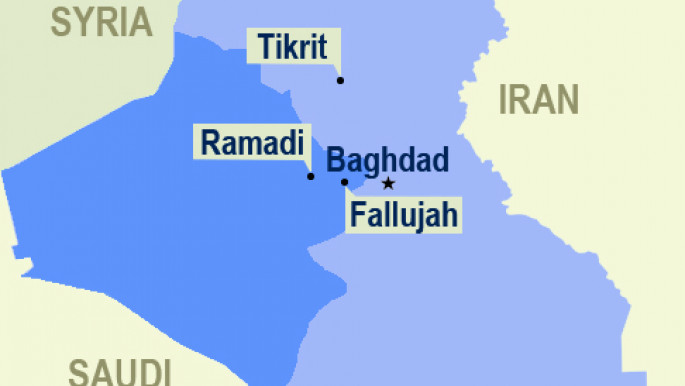Kurdish flag flies over Sinjar after capture from IS
Iraqi Kurdish leader Massoud Barzani announced the "liberation" of Sinjar from the Islamic State group Friday in an assault backed by US-led air strikes that cut a key supply line to the group's militants in Syria.
The operation, led by the autonomous Kurdish region's peshmerga forces, also involved fighters from the Yazidi minority, a local Kurdish-speaking community targeted in a brutal IS campaign of massacres, enslavement and rape.
The success of the campaign is the latest sign that IS, which won a series of victories in a stunningly rapid offensive in Iraq last year, is now on the defensive.
"I am here to announce the liberation of Sinjar," Barzani, the president of Iraqi Kurdistan, told a news conference near the northern town.
Barzani's remarks also made clear that political conflict over Sinjar would likely follow the military battle for the town.
"Sinjar was liberated by the blood of the peshmerga and became part of Kurdistan," Barzani said.
Baghdad, which has long opposed Kurdistan's desire to incorporate a swathe of disputed northern territory, is unlikely to welcome that.
Mahma Khalil, the local official responsible for the area, told AFP Friday evening: "The security situation is stable now in Sinjar."
"All the (IS) gunmen escaped from Sinjar."
Flags and gun fire
Earlier in the day, hundreds of Kurdish fighters, dressed in camouflage uniforms and armed with assault rifles and machineguns, moved into the town on foot, an AFP journalist reported.
Carrying the Kurdish region's flag, they firing in the air and shouted "Long live the peshmerga!" and "Long live Kurdistan!"
Inside Sinjar, many houses and shops, a petrol garage and the local government headquarters had been destroyed.
Burned out cars sat in the streets, while barrels apparently containing explosives had been left behind.
|
— Elijah J. Magnier (@EjmAlrai) November 13, 2015" style="color:#fff;" class="twitter-post-link" target="_blank">Twitter Post
|
The huge task of clearing Sinjar of bombs planted by IS remains, and there is also the possibility of holdout jihadists, who have kept up attacks even after other areas in Iraq were said to have been retaken.
The regional security council said "peshmerga forces entered Sinjar town from all four directions to clear remaining (IS) terrorists from the area."
Sinjar has been pounded by US-led air strikes and Kurdish artillery fire targeting IS positions, which sent massive columns of smoke drifting up from the town on Thursday.
The coalition carried out 36 strikes against jihadists in the Sinjar area on Wednesday and Thursday, and 15 more across the border in Al-Hol, where Syrian Kurdish forces and their Arab allies are battling IS.
In a rare admission Thursday, the Pentagon said US ground forces advising the Kurds on their offensive were close enough to the front to identify IS targets and call in strikes.
| Read more: Obama - US stepping up drive to 'completely decapitate' IS |
It is clear that Kurdish forces encountered little resistance, at least initially, suggesting that many of the IS fighters may have pulled back in anticipation of Friday's advance.
It was also possible that they could be biding their time before striking back.
Sinjar offensive
Peshmerga Maj. Ghazi Ali, who oversees one of the units involved in offensive, said thousands of Kurdish fighters entered the town from three directions Friday morning.
Associated Press journalists saw them raise a flag over a building in the city centre.
They encountered minimal resistance during Friday's push, Ali said.
Ali described the situation in the city as still dangerous, however, and warned that it was too soon to declare victory.
Iraqi Kurdish forces entered Sinjar on Friday in a major operation to retake the northern town from the Islamic State group, an AFP journalist reported.
Kurdish peshmerga forces moved on foot into the town, where many houses and shops have been destroyed, and damaged cars sat in the street.
Graffiti from the group's members had been painted on some houses, and barrels apparently containing explosives had been left behind.
Yazidi persecution
The major operation, which is led by the autonomous Kurdish region's peshmerga forces and also involves fighters from the Yazidi minority that has been brutally targeted by IS, succeeded in cutting a key jihadist supply line through the town to neighbouring Syria on Thursday.
Anti-IS forces then deployed around the town and prepared to move in.
 |
| [Click to enlarge] |
Permanently cutting the supply line, which links IS's Iraq hub Mosul with areas it holds in Syria, would hamper the extremists' ability to move fighters, equipment and other supplies between the two countries.
"By seizing Sinjar, we'll be able to cut that line of communication, which we believe will constrict (IS') ability to resupply themselves, and is a critical first step in the eventual liberation of Mosul," said Colonel Steve Warren, spokesman for the international operation against IS.
IS overran Sinjar in August last year, forcing thousands of Yazidis to flee to the mountains overlooking the town, where they were trapped by the jihadists.
The United Nations has described the attack as a possible genocide, and on Thursday the US Holocaust Memorial Museum echoed that claim in a report detailing allegations of rape, torture and murder by IS against the minority.
Aiding the Yazidis, whose unique faith Sunni Muslim group IS considers heretical, was one of Washington's main justifications for starting its air campaign against the extremists last year.





 Follow the Middle East's top stories in English at The New Arab on Google News
Follow the Middle East's top stories in English at The New Arab on Google News
![Israeli forces ordered bombed Gaza's Jabalia, ordering residents to leave [Getty]](/sites/default/files/styles/image_330x185/public/2176418030.jpeg?h=a5f2f23a&itok=_YGZaP1z)

